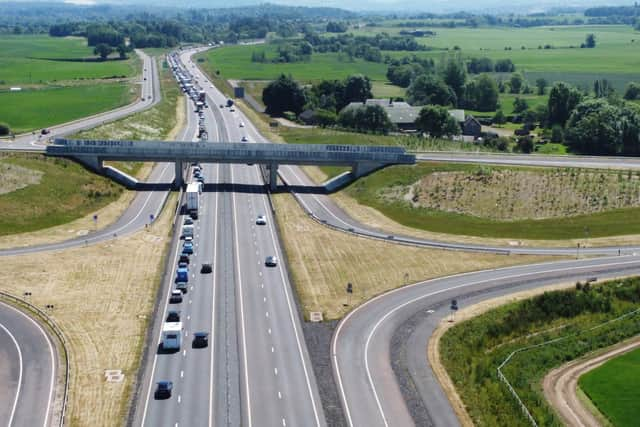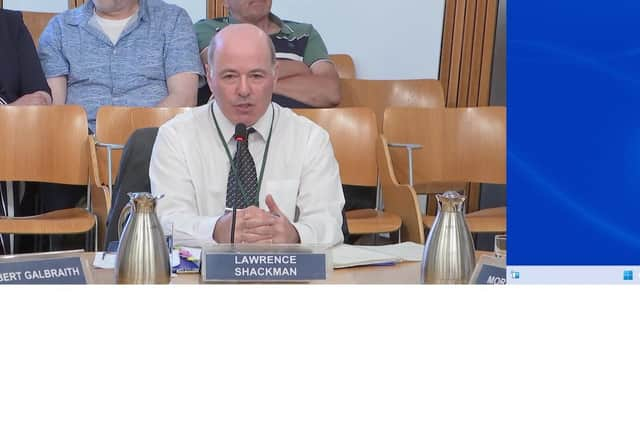Why did road builders call Transport Scotland the ‘worst client to work for in the UK’?
They were among Scotland’s biggest construction projects, bringing significant improvements to the country’s roads network and being finished on time and budget.
Their apparent success enabled Scottish Government ministers to have the satisfaction of seeing major schemes like the Queensferry Crossing over the Forth and completion of the M8, M74 and M80 motorways around Glasgow being built without significant hitch.
Advertisement
Hide AdAdvertisement
Hide AdHowever, in stark contrast to this overtly rosy picture, behind the scenes discontent among road-building firms was mounting, which spilled over into the open last week with construction industry chiefs condemning Transport Scotland, which let the contracts, as the “worst client to work for in the UK”.


The issue came to a head over the vexed problem of how to complete the mammoth scheme to widen the A9 between Inverness and Perth, which will involve a further 80 miles of dual carriageway. Ministers finally admitted in February that their 2011 pledge to finish the job by 2025 was “simply no longer achievable” – but they won’t announce when or how it will be achieved until this autumn.
Confirmation of the long-expected delay came after just 11 miles of new dualling had been opened since the SNP came to power 16 years ago. However, what triggered the announcement was a problem over the next section to be upgraded which went to the heart of the construction industry’s gripe with Transport Scotland.
It boils down to the Scottish Government agency’s use of a different type of contract for such projects to those employed by other public bodies across the UK, in which all the financial risks are borne by the contractor, which the industry has described as a “dated, unattractive anomaly”.
This is a separate issue to the other major headache ministers face over the A9 – how to fund it. They are said to have been previously keen on a PFI-style approach where the private sector funds and builds the road, with Transport Scotland repaying the cost over time, but rising interest rates has made this less attractive.


But using Scottish Government funding instead is expected to lengthen the project because of its limited availability.
The Civil Engineering Contractors Association Scotland (CECA), whose 100 members are responsible for 80 per cent of such work north of the Border, said the risk issue had caused firms involved in previous Scottish roads projects to lose money or even go out of business. There have also been claims that it led to aspects of the schemes remaining unfinished because of the contracts’ more complicated disputes procedure.
In the case of the next A9 stretch to be dualled, between Tomatin and Moy, near Inverness, the issue led to two of the three short-listed bidders pulling out, with the remaining firm lodging a tender significantly higher than the expected £115-125m. The increase is believed to have been caused by the risk being priced in.
Advertisement
Hide AdAdvertisement
Hide AdThe competition will now be re-run with a target of appointing a contractor by the end of the year, but its launch has been delayed by the appointment of new transport minister Fiona Hyslop last week. The £49.5m upgrading of the Haudagain roundabout bottleneck at the junction of the A96 and A92 in Aberdeen, which was completed last year, also only attracted one bid for a similar reason.


Former SNP rural economy secretary Fergus Ewing told MSPs on Wednesday that the lack of bids was a “completely unacceptable outcome when the whole purpose of the tender process is to attract competitive bids”. He said: “The system is broken, it’s not fit for purpose – that’s been obvious for quite a long time”.
He was speaking at the Scottish Parliament’s petitions committee, which considered a report from CECA Scotland chief executive Grahame Barn that said: “Transport Scotland rely upon their bespoke contract when procuring road projects. This contract is identified by industry as being a fixed price, design and build contract where all the (financial) risk lies with the contractor."
Mr Barn said this included from ground conditions, weather and utilities [such as water and electric pipes and cables]. He said: "The contractor has no control over the risk posed by these and consequently any financial loss or time penalty arising out of one or multiple ‘risks’ must be borne solely by the contractor under the terms of the contract.”
He later told Scotland on Sunday: “Transport Scotland may feel that projects like the Queensferry Crossing, M8/M73/M74 bundle and the Aberdeen Western Peripheral Route (AWPR) might have been good outcomes for the taxpayer. However, the principal contractors in each case made significant losses that were critical to the future of many involved.


"In fact, one contractor went bust as a direct result of the M8/M73/M74 bundle – Lagan Construction. Carillion were pushed over the edge by AWPR, and Galliford Try had to undergo a deep company restructure as a result of losses on that scheme, and they no longer have a road-building capability in Scotland.
"We would argue, based on the losses incurred on these projects, that the Scottish Government secured these projects at below true market prices. That is not sustainable for contractors, nor the wider health of the construction industry in Scotland.
“The vast majority of contractors in the UK with road-building expertise are not prepared to take the financial risk of entering into a contract using Transport Scotland's bespoke contract. They have witnessed the carnage that it has wreaked on the contractors involved and now choose not to bid for such work.
Advertisement
Hide AdAdvertisement
Hide Ad"This is a significant problem for Transport Scotland as they have very few contractors willing to bid for work that they are trying to procure.
"I understand that the Queensferry Crossing [which opened in 2017] has reached final settlement, so that is ‘complete’ now. There will be many outstanding issues/disputes on other road projects."
Mr Barn said the industry norm everywhere else was the “New Engineering Contract” (NEC) which had been used for 30 years, in which risk was shared between client and contractor, which fostered a “collaborative delivery approach”. This includes Scottish councils, which are responsible for all roads apart from motorways and other trunk routes.


He suspected Transport Scotland had held onto its type of contract because it provided “absolute price certainty”. He said: “It means that a minister does not have to go back to the Scottish Parliament to explain why a project has cost more than originally announced.”
Another industry source told Scotland on Sunday: “This is a complaint that contractors have been making for a very, very long time. Transport Scotland is the only public body left in the UK as far as I’m aware that is still using the old contract, which is a very old school way of doing things.
"All the risk in the project is transferred to the contractor so if there are any disputes, it can be quite difficult for them to put their case across and be compensated for changes. But the NEC contracts include agreed processes for dealing with changes and disputes, which make large projects much simpler to manage.
"Transport Scotland is very risk averse and likes to transfer all the risk away, but that’s not reasonable in the current environment where construction inflation is high and material costs can change very quickly and contractors fear they are going to be left out of pocket.”
The source said it was “inevitable” that the agency would have to change its contract since there were several other major roads projects in the pipeline beyond the A9 dualling, such as a rock shelter to protect the A83 at the Rest and Be Thankful in Argyll, improving a twisty section of the A82 beside Loch Lomond, and upgrading roundabout bottlenecks at Sheriffhall on the Edinburgh City Bypass and Longman on the A9 in Inverness.
Advertisement
Hide AdAdvertisement
Hide AdThey said: “The sharing of risk would make it easier for contractors to bid for work as they’re not worried they are going to lose a lot of money. It’s true the Transport Scotland contract has protected the public purse, but a lot of contractors have lost a lot of money on these projects.
"That knowledge has spread through the industry and now we have firms unwilling to bid for projects. That’s why the two other tenderers walked away from the latest A9 contract because they did not want to sign up to something in the current climate that would potentially see them lose millions of pounds.
"You also pay for risk through the contract – if you are trying to transfer all the risk to the contractor, they are going to charge accordingly.”
The CECA’s withering criticism comes five years after public spending watchdogs raised concerns about the Queensferry Crossing contract. Audit Scotland’s assessment of the project concluded: “The two contractors that bid for the principal contract told us that Transport Scotland expected them to take on a higher level of risk than they were
comfortable with.
"For future projects, Transport Scotland needs to consider the appropriate level of risk-sharing and innovation allowed on contracts. This is important for Transport Scotland to attract sufficient interest, encourage high-quality bids and keep procurement competitive.”
The situation has exasperated groups representing drivers. Neil Greig, the policy and research director of IAM RoadSmart, who is also a member of the Scottish Government-led A9 Safety Group, said: “Transport Scotland’s approach to road building contracts may have worked before for very large schemes, but is clearly not fit for purpose on the A9.
“We would urge it to work with the road industry to establish a system that works in the Highlands and which has a key focus on delivering the desperately-needed A9 schemes as soon as possible.
"It still make no sense to us that a government policy to dual the A9, universally supported in Holyrood, never came with an accelerated planning and inquiry system to help fast track it. Continued delay means everyone is a loser: Companies who could be providing new jobs, the taxpayer, and most of all, A9 users putting up with increased risk and disruption.”
Advertisement
Hide AdAdvertisement
Hide AdTransport Scotland director of major projects Lawrence Shackman told the committee on Wednesday he accepted Mr Barn’s criticisms and “cannot see a future for our form of contract”. He said: “We need to have collaboration at the heart of our contracts.
"The alternative form of contract is very much up for discussion so we can balance value for money for the public purse against making sure contractors make a reasonable profit...or they are not going to tender for us. We need to come together to make sure we do get a consensus and a reasonable risk profile.
"The Tomatin to Moy procurement has really crystallised this issue. We have been looking at the potential to change our contracts for a while, but over the 20 years plus we have been using them, it has given ministers a good surety of out-turn costs compared with the tender costs. In terms of protecting the public purse, it was very effective.
A Transport Scotland spokesperson confirmed it was planning changes. They said: “We are engaging with the construction industry, including CECA Scotland and contractors, to consider changes to our standard procurement and contract terms to better reflect current market conditions in a bid to maximise interest and competition for a new procurement for the A9 Dualling: Tomatin to Moy project.”
Comments
Want to join the conversation? Please or to comment on this article.